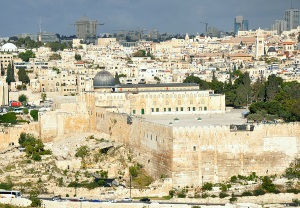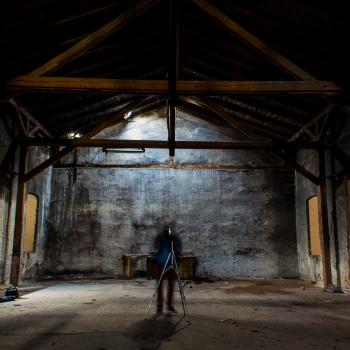Continued from yesterday.
Soon after landing at JFK from Tel Aviv Friday afternoon, I’m greeted by my tearful mother who can take her first deep breath in nearly two weeks. I’m relieved to learn that my family is en route from Tel Aviv, an hour into their flight as scheduled. But when we reach the parking garage, a call from my father-in-law informs us that the flight has been turned back due to electrical problems.
What! Back to Tel Aviv? Back to the airport targeted by Hamas earlier that day? If there’s any consolation, I guess it’s that we’ll only have to wait an hour and a half before the flight takes off again.
My instincts as a screenwriter, so engaged during my five-week work stint on Dig in Israel, must be on hiatus for me not to know that this will probably get worse before it gets better.
I am still in the car, sitting in the driveway at my mom’s house in Connecticut for what was to have been a weekend of rest and togetherness, when I manage to get on the phone with my wife after several failed attempts. It’s 2:30 a.m. in Israel, but she and the kids are no longer at the airport: they’re on a bus headed for a hotel in Tel Aviv because the flight has been cancelled. The airline has told her the earliest they can fly out is Sunday at noon, a day and a half away.
A day and a half of air sirens and bomb shelter runs. This isn’t happening.
“Daddy?” my oldest daughter says between tears when my wife passes her the phone on the bus to the hotel. “I want to come home.” Thankfully it isn’t fear as much as exhaustion that I hear in her voice, as we had only made the children partially aware of the situation.
“I know, sweetheart,” I tell her from the safety of my mom’s car, assuring her that she’ll be home soon.
On the phone with United Airlines in my mom’s kitchen a short time later, I tell them that Sunday at noon is unacceptable. “Find me another flight on another airline, right now.” Delta 469 on Saturday at midnight is the best they can offer. My wife, who is on the other line, says they could use the rest Saturday anyway, and will lie low at or near the hotel. They’ll be fine, she says. Delta 469 it is.
Cut To:
After four hours of fitful sleep, I wake to a text exchange between my brother and my wife that he’s forwarded to me. In response to his loving concern, she replied:
I am feeling joyful to be alive actually, the mid flight power outage thing was kind of hair-raising, and we are in a nice hotel here, about to go find one more fantastic felafel, we are so looking forward to seeing you all tomorrow!
Power outage? I’d only heard the words, “electrical problems.” She never mentioned a full-blown power outage when we spoke. As in, the plane went dark? Holy shit. Gulp. At least that kind of thing can’t happen twice in one trip.
If an ominous music cue follows that thought in this drama, I don’t hear it.
Saturday passes without incident, until Hamas announces at 8:00 p.m. that they will be launching a new round of attacks at 9:00 p.m.—just when my family is due to head back to the airport. I receive a photo from my wife of the girls eating burgers at Ben Gurion for the second night in a row. They look so tired, so ready to come home. Please, God, get them back to me safely.
After tracking their takeoff from my brother’s porch, I head to my sister’s to continue the vigil. All looks well nearly two hours into the flight, until it’s posted that the plane has been delayed four and a half hours.
My first response is terror because it doesn’t make sense: How could a flight I’ve been tracking suddenly be delayed? For a split second I assume it has crashed. No, my sister learns upon calling the airline—but it has been sent back to Tel Aviv due to mechanical problems.
What the hell is going on? This isn’t happening!
Oh, but it is. The plane is on the ground before I learn that its troubles were a news story while still in the air: Delta 469 was headed back to Tel Aviv for an emergency landing with ambulances and emergency vehicles parked on the runway. Had I known that before the plane touched down safely, I might have been the family member who didn’t survive.
No sooner does my wife reclaim their baggage at an ungodly hour in Ben Gurion than I find them an Alitalia flight leaving at dawn. Four one-way tickets through Rome and seven thousand dollars later—an equally unaffordable and trivial debt—I sleep for two hours until the third vigil in two nights resumes.
Begin Montage:
The happy, teary reunion with flowers and balloons at JFK.
My repeated viewings of the photo my wife took of our three kids sleeping on the second flight while the plane flew in circles for an hour dumping gas before its emergency landing.
Repeated wonderings if my prayers had ultimately been answered like Jonah’s, or if I had just gotten lucky in the face of odds beyond all reason.
My own imagined tragedy has come to life horrifically for other parents and loved ones when the soaring children’s death count in Gaza combined with the downing of Malaysian Air Flight 17 plunges me into a pit of PTSD despair at the world.
End Montage.
I step back out to the edge of this precipice on which I was perched for two days straight like the frailest bird. It’s no wider than a knife blade, and just as sharp. Push me off and I can’t be sure I would have the faith to ever fly again—despite my wife’s rejoinder when I say as much to her in a precoital embrace after her return.
“You would, too, make it,” she says with a brusque touch of admonishment. I’m glad she’s so sure, because I’m not.
Fade to Black?
Yes, but perhaps only to end where it all began: when darkness was on the face of the deep.
Bradford Winters is a screenwriter/producer in television whose work has included such series as Oz, Kings, Boss, and The Americans. His poems have appeared in Sewanee Theological Review, Spoon River Poetry Review, and Georgetown Review, among other journals. He lives in Brooklyn with his wife and three children.












